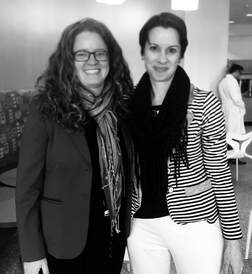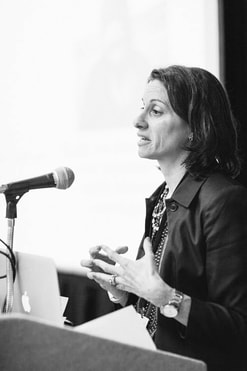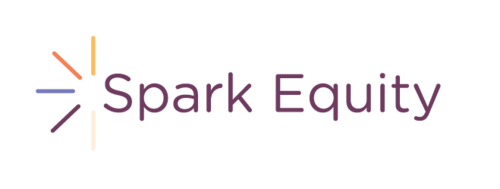
Before I get into the interview, I would like to share for the first time in my own space and domain that I am a childhood sexual abuse survivor. There are very few people who know this. But the time has come for me to share my story and finally heal out loud and hopefully help some others heal too. I have been in a low, dark place where I didn't want to interact with the world. I have felt lonely, tainted, unworthy, fearful and more. But I am so thankful to have found Elizabeth a few years ago professionally and personally. Over the last couple of years I have purposely opened myself to feel feelings that I buried deep inside of me and I am on the path to being healed and whole so that I can fully give all of myself to my family, my clients and the world.
1. Tell me about yourself and how you began your career.
My oldest child is six years old. And like many new mothers, breastfeeding was difficult. For me, it was due to being a rape survivor. I searched for resources and came up empty. One day I found Penny Simkin's book When Survivors Give Birth and I found a medical care provider who oriented lots of medical information. Eventually I reached out to Penny about training under her so I could share her knowledge with doulas and other birth educators. I completed my Postpartum Doula training through DONA International and became a Certified Childbirth Educator through Lamaze International. I wanted to do work that reached people like me. I wanted the world to know how sexual abuse and assault affects the reproductive process and sexual experiences.
I began my community work as a peer counselor for Durham Crisis Response and worked with them for just under a year before starting my own peer support group. We meet every week on Tuesdays from 6:30-7:30 p.m. at Dress for Success Triangle NC in Durham.
2. Describe the survivor culture & community in the Triangle area?
I see very different survivor communities here. One thing that is pervasive across the US and here in the Triangle is that some survivors feel safer identifying publicly as a survivor. I am part of that group. I'm white, well-educated, relatively thin and very seldom have my words challenges. Being a survivor is an asset I bring to the professional trainings I host. But women of color I know who have less privilege or who have significant health issues or are very religious often do not feel as comfortable identifying as a survivor. Sometimes even there own church won't talk or accept sexual abuse as an issue that faces many families in their community. And if they don't feel safe in their church identifying as a survivor, a place where they connect with God and those who love God, then the rest of the world with its prejudices and public hate definitely does feel as safe. So privilege as a survivor to own that history is a very real thing.
3. What are some common themes and behaviors that come up for survivors?
More often than not, many survivors have a difficult time setting boundaries, trusting people, being vulnerable, having healthy relationships, telling others what they need and how to treat them, overcoming past hurts and family issues, whether or not to confront their abuser (if that is an option), recognizing what helps and what hurts and being comfortable with their pregnant body and the physical and emotional changes women go through during pregnancy, birth and postpartum.
4. Where do you see your business in 5 years?
I see myself doing work that connects me to survivors more directly. I am in the midst of a workbook for survivors (and others!) about Relationship Red Flags and what you should know before you start dating again. I will also launch a peer support guide planner later this year for folks who want to offer their own peer support groups but are unsure how to get started. In the next few years I am hoping to launch a podcast so I can speak more directly to and with survivors. Lots of efforts to connect more with survivors and arm them with better information about their own health, wellness and recovery than what's currently out there!
5. What advice do you have for any survivor looking to start their healing? Advice for birth workers who want to help them?
Birth workers who want to better support their clients should definitely attend my When Survivors Give Birth one day training. There is no where else to receive the concise, evidence based, current, trauma-informed, survivor sensitive content. It's offered once a year, usually in December, here in Durham and many folks get CE credit to attend.
Survivors who are looking to heal should get support first. Talking about abuse is hard. But it shouldn't feel harder because the professional you're talking to doesn't get it. And many mental health providers don't get it. For example, white providers who don't understand how race can impact both their relationship with the survivor and how race can impact how survivors can heal, especially within their own families do more harm than good. If the survivor is a person of color and they feel they must see a therapist, then they should get with a therapist who is a person of color.
But they don't have to in order to heal! Sexual abuse is not a mental health disorder.
But mental health professionals sometimes see it that way and as a way to help offer medication as a step toward healing. Pharmaceuticals are not the key to healing from sexual abuse; talking about it with a loving supportive community is. Even one person who gets it, "counts". And I think its even better if that person is not a mental health professional but someone who gets it. That's why a peer support group is so powerful. I offer a free, open to female-identified survivors and happens every Tuesday 6:30-8:30 pm. More details are on my website.
6. Who are some people or professionals that inspire you?
Gosh so many! Ms. Tarana Burke, the founder of #MeToo, is a huge inspiration. I look up to author and survivor Roxane Gay and feminists like Gloria Steinem, Soraya Chemaly, Anita Hill and Kimberle Crenshaw. Professionally, I also look to Malcolm Gladwell and Brene Brown both of whom use story to teach in ways that I try to adopt.
7. Tell me about your most recent personal and/or professional win.
In early March I spoke at Duke University's OB/GYN Grand Rounds teaching experience. It's a 45 minute talk followed by a 15 minute Q&A. I talked about the importance of trauma informed, survivor sensitive care and simple tweaks providers can make, including choosing to see their patient as an expert on themselves, to 100 residents, physicians, fellows and students. I have been urged by other survivors for years to talk to the doctors and finally it happened! It went well and I was thrilled to be there. See the attached photo!


 RSS Feed
RSS Feed